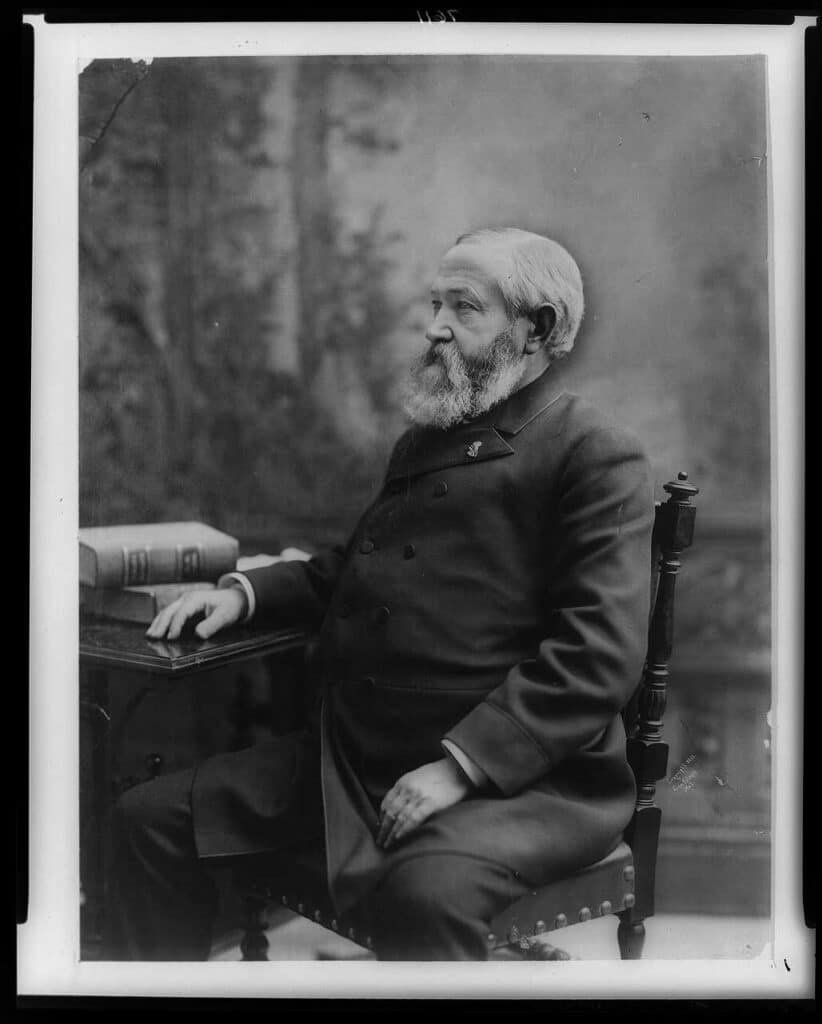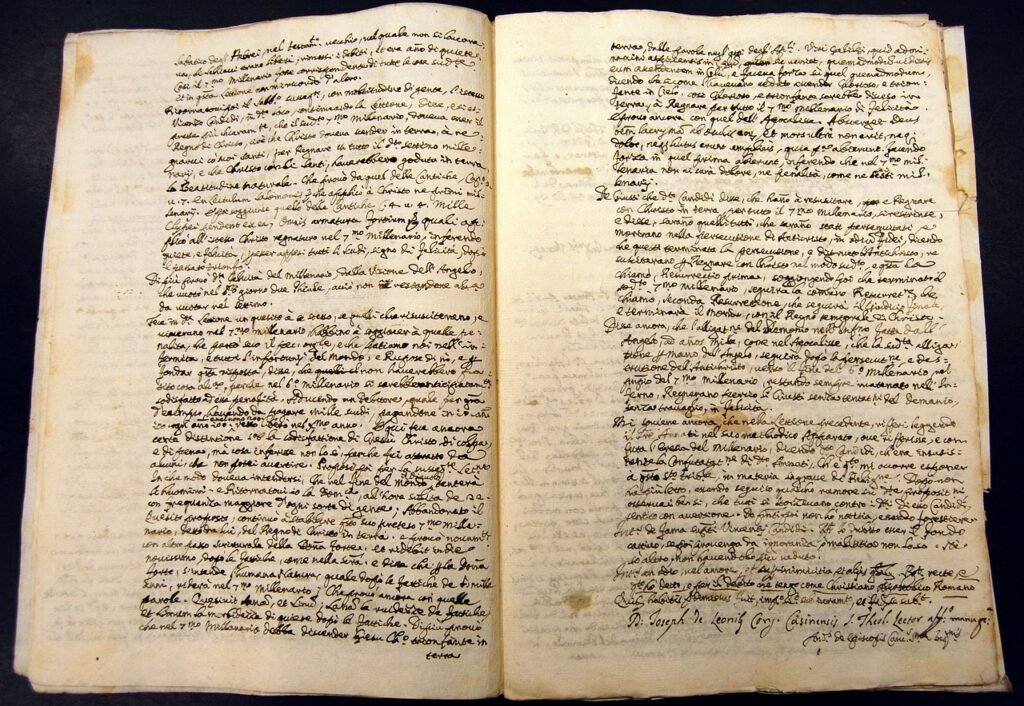




Benjamin Harrison Biography
Benjamin Harrison, the 23rd President of the United States, served from 1889 to 1893. A grandson of William Henry Harrison, the ninth president, Benjamin Harrison’s administration was marked by significant economic legislation, expansion of the U.S. Navy, and advocacy for African American civil rights. His presidency navigated the complexities of post-Civil War America, focusing on modernization and reform. This biography examines Harrison’s life, career, and legacy, emphasizing his contributions to American political history.
Early Life and Education
Benjamin Harrison was born on August 20, 1833, in North Bend, Ohio. He was the second of ten children born to John Scott Harrison and Elizabeth Irwin Harrison. The Harrison family had a long history of public service, with his grandfather, William Henry Harrison, serving as president and his father, John Scott Harrison, serving as a congressman (Sievers, 2003).
Harrison’s early education was rigorous, reflecting his family’s emphasis on learning and public duty. He attended Farmer’s College near Cincinnati and later transferred to Miami University in Oxford, Ohio, where he graduated in 1852. At Miami University, Harrison excelled academically and was a member of the Phi Delta Theta fraternity, which shaped his leadership skills and network (Calhoun, 2005).
Legal Career and Civil War Service
After graduating, Harrison studied law in Cincinnati and was admitted to the Ohio bar in 1854. He moved to Indianapolis, Indiana, where he established a successful legal practice. Harrison’s reputation for integrity and legal acumen grew, leading to his election as the City Attorney of Indianapolis in 1857 (Calhoun, 2005).
With the outbreak of the Civil War, Harrison’s sense of duty propelled him to join the Union Army. He began as a second lieutenant and quickly rose through the ranks to brevet brigadier general by the war’s end. Harrison’s leadership and bravery during key battles, including the Atlanta Campaign and Sherman’s March to the Sea, earned him respect and recognition (Graff, 2010).
Political Ascent
After the Civil War, Harrison returned to Indianapolis and resumed his legal career. His wartime service and legal expertise positioned him for a political career. In 1876, he ran for and won a seat in the U.S. Senate, representing Indiana. As a senator, Harrison was known for his advocacy for veterans’ benefits, support for the protection of African American voting rights, and his involvement in tariff debates (Sievers, 2003).
Harrison’s senatorial career showcased his commitment to civil rights and economic policy, aligning him with the Republican Party’s core values. Despite losing his Senate seat in 1882 due to a Democratic majority in the Indiana legislature, Harrison’s national profile continued to rise, leading to his nomination for president in 1888 (Calhoun, 2005).
Presidency (1889-1893)
Benjamin Harrison won the 1888 presidential election, defeating incumbent Grover Cleveland in the electoral college despite losing the popular vote. Harrison’s presidency was marked by significant legislative achievements and efforts to modernize the nation.
Economic Legislation
One of the most notable aspects of Harrison’s presidency was his support for economic legislation. The McKinley Tariff of 1890, named after Representative William McKinley, raised tariffs to protect domestic industries from foreign competition. While it aimed to stimulate American manufacturing, the high tariffs also led to increased consumer prices and were a point of contention (Graff, 2010).
Harrison also oversaw the passage of the Sherman Antitrust Act in 1890, the first federal legislation to prohibit monopolistic business practices. This act aimed to promote fair competition and curb the power of large corporations, reflecting Harrison’s commitment to economic fairness (Calhoun, 2005).
Civil Rights and Voting Rights
Harrison was a strong advocate for African American civil rights. He supported the Federal Elections Bill of 1890, also known as the Lodge Bill, which sought to protect the voting rights of African Americans in the South by providing federal oversight of elections. Despite Harrison’s efforts, the bill faced significant opposition and ultimately failed in the Senate (Sievers, 2003).
Harrison’s commitment to civil rights extended to his administration’s appointments and policies. He appointed Frederick Douglass as U.S. Minister to Haiti and supported legislation to improve education and economic opportunities for African Americans. These efforts, though limited in success, demonstrated Harrison’s dedication to civil rights (Calhoun, 2005).
Foreign Policy and Naval Expansion
Harrison’s presidency marked a period of active foreign policy and naval modernization. Recognizing the strategic importance of a strong navy, Harrison supported the expansion and modernization of the U.S. Navy, transforming it into a formidable force. The construction of new steel warships during his administration laid the groundwork for future naval power (Graff, 2010).
In foreign affairs, Harrison’s administration negotiated reciprocal trade agreements with several nations, promoting American exports and strengthening economic ties. He also convened the First International Conference of American States in 1889, which led to the establishment of the Pan-American Union, fostering cooperation and trade among the Americas (Sievers, 2003).
Domestic Challenges and Reforms
Harrison’s presidency faced several domestic challenges, including economic recession and labor unrest. The Sherman Silver Purchase Act of 1890, which required the government to buy large quantities of silver, aimed to address deflation and support farmers and miners. However, it also contributed to financial instability and was later repealed (Calhoun, 2005).
Harrison’s administration also dealt with labor strikes and demands for better working conditions. The Homestead Strike of 1892, a violent labor dispute at the Carnegie Steel Company, underscored the tensions between labor and industry. Harrison’s handling of the strike, including the use of federal troops to restore order, highlighted the complexities of labor relations during his presidency (Graff, 2010).
Personal Life and Character
Benjamin Harrison was known for his serious and reserved demeanor, often described as aloof. However, those who knew him well regarded him as deeply principled and compassionate. Harrison married Caroline Lavinia Scott in 1853, and they had two children, Russell and Mary. Caroline’s death in 1892 deeply affected Harrison, and he later married Mary Scott Lord Dimmick, his first wife’s niece, in 1896 (Calhoun, 2005).
Harrison’s religious faith was a central aspect of his life, guiding his ethical standards and public service. He was an active member of the Presbyterian Church and frequently spoke about the importance of moral integrity in politics (Sievers, 2003).
Legacy
Benjamin Harrison’s presidency left a lasting impact on American politics and governance. His commitment to civil rights, economic reform, and naval expansion reflected his vision of a modern and equitable nation. While his presidency faced criticism for high tariffs and handling of labor disputes, his efforts to promote fair competition and protect voting rights were significant contributions to American political development (Calhoun, 2005).
Harrison’s advocacy for civil rights, though met with limited success, set a precedent for future efforts to ensure equal voting rights and opportunities for African Americans. His support for the Sherman Antitrust Act laid the foundation for antitrust legislation that would shape American economic policy for decades (Graff, 2010).
Historians generally regard Harrison as a president who navigated the complexities of his time with integrity and a commitment to progress. His administration’s achievements in economic legislation, civil rights, and naval modernization underscore his role in shaping the trajectory of the United States during a pivotal era.
Final Summary
Benjamin Harrison’s presidency is a testament to his dedication to principles of fairness, modernization, and reform. From his early life in Ohio to his service in the Civil War and his tenure as president, Harrison consistently demonstrated a commitment to public service and ethical governance. His contributions to American political history, particularly in economic policy and civil rights, continue to resonate today. Harrison’s legacy as a principled leader who navigated the challenges of his time with integrity and vision remains an enduring part of American history.
References
Calhoun, C. W. (2005). Benjamin Harrison: The 23rd President, 1889-1893. Henry Holt and Company.
Graff, H. F. (2010). Benjamin Harrison. Times Books.
Sievers, H. (2003). Benjamin Harrison: Hoosier Statesman. University Press of America.
Nichols, R. (2008). The Shadow of a President: Benjamin Harrison. Indiana Historical Society Press.
Garraty, J. A. (1991). The New Gilded Age: The Republican Presidents from Hayes to McKinley. Charles Scribner’s Sons.
